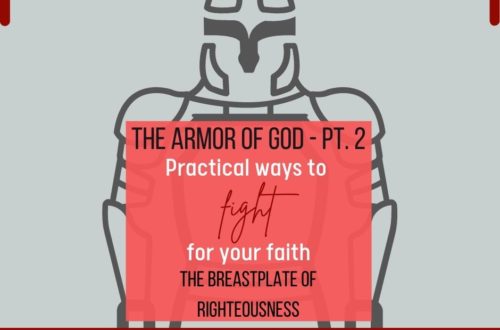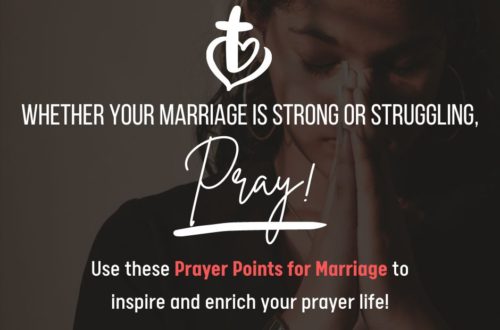What is Apologetics (& Why is it Important)?
Have you ever found yourself in a conversation about your faith or religion, not able to articulate what you believe or why you believe it? Or maybe someone was telling you that your beliefs were not “true” or “real” or were wrong in some way. Did you know that the Bible charges us to “always be prepared to give an answer for the hope that we have?” Well, to satisfy all of these issues, you need apologetics! If you’re now wondering, “What is apologetics?” stick around! I’ll tell you exactly what it is (and what it isn’t) and why it’s important for every Christian (not just professors, authors, and other super-smart people).
Contents
Apologetics Definition
Despite its name, apologetics is not apologizing for being a Christian or for having the beliefs that you have. And it also isn’t making someone sorry they asked by treating them with disdain and judgment for challenging your beliefs. LOL! Apologetics also is not a way for us to cram our beliefs down the throats of people who don’t agree with us. Apologetics is simply being able to act both offensively and defensively in sharing your beliefs and why you hold to them.
If I were asked to define “apologetics,” I would first define it in a general sense by looking at the root word, “apologia,” which is Greek for “answer back,” “respond,” or “defend.” Taking it a step further, to define Christian apologetics, I would go with William Lane Craig’s definition. He says that “apologetics is that branch of Christian theology which seeks to provide a rational justification for the truth claims of the Christian faith.” “Biblical apologetics” is just another way to say “Christian apologetics,” and most people, when they talk about apologetics, are talking about defending the Christian faith.
“Apologetics is that branch of Christian theology which seeks to provide a rational justifcation for the truth claims of the Christian faith.”
William Lane Craig
2 Types of Apologetics
Did you know that there are 2 types of apologetics? I didn’t! There are positive apologetics and negative apologetics. No, one isn’t good and the other bad. In fact, knowledge of both is necessary to develop the ability to make disciples like we’re called to do in Matthew 28:19.
“Therefore, go and make disciples of all the nations, baptizing them in the name of the Father and the Son and the Holy Spirit.”
Matthew 28:19 (NLT)
Positive apologetics is giving arguments for your beliefs. It’s the offensive approach to sharing “the reason for the hope in us.” For instance, you might share that you believe that God created the world and then show them why you believe it by discussing what nature reveals about God or how everything that exists had to be created by something outside of itself.
Negative apologetics is defending your faith against objections or challenges. This is the defensive line of apologetics. For example, someone might tell you that they don’t see how a good God could allow bad things to happen or that the Bible has too many contradictions to be reliable. If you could tell them about free will making the bad stuff necessary along with the good or point out that apparent contradictions in the Bible could be a result of faulty interpretation instead of actual error, you’d be using negative apologetics.
Apologetics in the Bible
So why should everybody learn apologetics? Well, most importantly, the Bible talks about doing it and why it’s important; even Jesus used apologetics! Let’s take a look at some places in the New Testament that talk about Christians being able to defend Christianity.
1 Peter 3:15 (ESV) – “…but in your hearts honor Christ the Lord as holy, always being prepared to make a defense to anyone who asks you for a reason for the hope that is in you; yet do it with gentleness and respect.”
This verse gives 2 pieces of advice. First, always be ready to defend the hope that is in you (which should be visible to others by how we live our lives if we’re trusting the Lord, Jesus Christ). Second, it also tells us how to do it – in a gentle and respectful manner. Learning apologetics is how you learn to present and defend your beliefs in a way that gets people thinking about core Christian beliefs in a new and desirable light. What’s more, doing this shows that we honor Christ as holy in our hearts!
Jude 1:3 (ESV) – “Beloved, although I was very eager to write to you about our common salvation, I found it necessary to write appealing to you to contend for the faith that was once for all delivered to the saints.”
Why is Jude writing to believers about contending for the faith? If you keep reading, you’ll see exactly what he’s talking about. In Jude 1:4, you’ll see that he’s speaking about “certain people [who] have crept in unnoticed … ungodly people, who pervert the grace of our God into sensuality and deny our only Master and Lord, Jesus Christ.” Just like what’s happening today, people were coming into the church like wolves in sheep’s clothing, distorting the Gospel and people’s understanding of who Jesus is and what grace means.
Jude is exhorting his readers to use apologetics to defend the truth against the so-called “progressive Christians” and false teachers who find an audience among members of the Church. We have to know and be able to articulate the truth in God’s word to identify and resist the lies these “ungodly people” who are leading people astray in droves!
Luke 1:3-4 (ESV) – “…it seemed to me also, having followed all things closely for some time past, to write an orderly account for you, most excellent Theophilus, that you may have certainty concerning the things you have been taught.”
When Luke says he “wrote an orderly account,” he was talking about writing down the facts and the things that he witnessed. Passing this account along to Theophilus was meant to make him confident in sharing what he had learned from Luke. Like Theophilus, we can learn that there is solid evidence for our beliefs and what it is. This will give us “certainty concerning the things we have been taught.” There is confidence in learning exactly why we believe what we believe. And when we are confident in our beliefs, it’s easier to share them with people, especially people who may not share the same beliefs.
Acts 1:3 (ESV) – “He presented himself alive to them after his suffering by many proofs, appearing to them during forty days and speaking about the kingdom of God.”
Jesus himself was making sure that His apostles could confidently share the truth of His resurrection by showing himself to them. Here is another example of the confidence we can gain through understanding the evidence for our beliefs. This confidence in talking about one’s faith is one of the reasons apologetics is important (more on that in a bit).
What is an Apologist?
Now let’s talk about apologists. When most people think of Christian apologists, they think of people standing behind a podium arguing with atheists about why they’re right and the atheists are wrong. Or maybe they think of a professor teaching a class on Christian apologetics. While these types of apologists do exist, I would argue that most apologists will never find themselves in front of a big group of people at all.
Every Christian has opportunities every day to be an apologist. – Coren Millikan Share on X
The fact is, every Christian has opportunities every day to be an apologist. Here’s what I mean… Do you ever talk to anyone about your faith or beliefs? Think about it – are you part of any community activities or business dealings with people who don’t go to church? Do you have kids who need to learn about your family’s beliefs? What about friends or acquaintances who are part of a different religion? If so, you have opportunities to be an apologist! An apologist is simply anyone who has conversations with people about their faith using solid evidence to back up their ideas. Christian apologists also defend their beliefs against opposing viewpoints.
I plan on writing more on exactly how to have these conversations, so if you want to stay in the know on new blog posts (and Etsy shop updates), hop on over to FB and follow Catching Courage!
One way to think of apologists is to think of them like lawyers. They give a case for their position. They defend their position. They’re persuasive. They’re calm, collected, and confident, and they know their stuff because they’ve done their research. They know the questions they’re opponent might ask, and how they’ll answer them. And they anticipate how their opponent will respond to their arguments, so they know how they should respond in turn.
Why is Apologetics Important?
Learning apologetics is important for several reasons, not the least of which is that we are told to do it in the Bible. This is certainly true, as we saw in the apologetics Bible verses above, but what else?
Apologetics Builds the Believer’s Confidence
The first benefit of learning apologetics is that it builds confidence. How often do you find yourself with an opportunity to share your faith with a non-believer or even in a conversation with another believer and you can’t articulate your thoughts about your beliefs? Knowing why you believe what you believe puts you in a much more positive mindset about these conversations and gives you more clout with non-believers and believers alike. Think of the cool, calm, and confident lawyer we talked about earlier.
Apologetics Strengthens the Church
Not only does studying apologetics strengthen the individual, but it also strengthens the church as a whole. When members of a group don’t share the same beliefs or can’t share their beliefs or the reasons they hold to them, the group is weak and at risk of being undermined by outsiders. This is the last thing we want to happen to the body of Christ! If we’re going to make an impact for God’s kingdom in this dark world, we must come together to take seriously the charge to continue growing in the faith by studying God’s word and coming to terms with the logical side of our faith.
{Related – Better Together-Community in the Bible}
Apologetics Helps Believers Fight Cultural Lies
The ability to use apologetics to defend one’s faith is a skill that is becoming more and more important as culture becomes more and more resistant to and even hostile towards Christian beliefs. It used to be that most people had similar beliefs. There were just a few churches in each community that most people went to. They discussed their beliefs amongst themselves and were mostly in agreement with each other. Then they went home and lived out those beliefs. And that was that.
Unfortunately, this is not the case today. Culture has widely begun to believe the enemy’s lies. Lies like “nobody can tell you what’s right and wrong,” “anybody who disagrees with you hates you,” and “you are enough” have infiltrated Western culture, making it all the more imperative that we learn the truth with which to combat the lies. People who believe these lies need to hear that there is evidence that God built morality into our very core and that it isn’t relative; that the very definition of tolerance requires disagreement; and that we aren’t enough on our own and require saving by a loving Savior.

What’s more, with the advance of technology, people obtained the ability to spread beliefs in opposition to Christianity. TV, the internet, and social media have given a loud and persistent voice to people who disagree with conservative Christian beliefs. Even Christians with new ideas about core Christian doctrine use these channels to widely disseminate their incorrect information and convince other Christians to agree with them. Luckily, we can use the same methods to defend the right beliefs if we learn how to do it right…with apologetics!
To be able to compel people to consider the truth of our beliefs, we need to be able to articulate why we believe what we believe. “I just believe it” or “It’s in the Bible” will no longer work as valid arguments for our faith, especially with non-believers. Skeptics today want solid evidence. They need Christians to tell them how history, science, and anthropology confirm that the events of the Bible actually happened. They need Christians to calmly and kindly listen to their questions and give them real answers instead of instantly judging and condemning them or clamming up!
Christian Apologetics is for Every Christian
Christian apologetics is for every Christian, not just the “super smart” ones. The more Christians who hop aboard the apologetics train the better! All Christians must work on both being able to present core Christian truths in a believable way and learning to defend these beliefs against culture’s lies. It’s the only way to keep current Christians on the right track and bring more people into God’s kingdom for all eternity. It’s literally a life-and-death situation. Souls are at stake and people’s faith is being undermined every day because of cultural attacks that aren’t being fought with truth and love.
It’s worth mentioning that beginning a journey like this requires courage. You’ll likely come across stuff you don’t understand and end up with more questions than you started with. Don’t worry or get frustrated! Find a mentor who has been studying this stuff for longer than you have and gather some like-minded friends alongside you to hash things out with. As long as you’re willing to keep seeking the truth, it’ll be way worth it in the end! You might even find it to be invigorating and just the thing you need to stir up the Spirit in you!
How to Start Your Apologetics Journey
Are you convinced that you need to learn apologetics? I hope so! If I was starting this journey again, I would start by writing down what I know I believe. If I could articulate anything about why I believe it, I’d write that down, too. And I’d make note of any questions or doubts I had. Don’t freak out if you do have doubts and questions! It’s OK! Acknowledging them is the first step to finding the answers! Next to each question or doubt, write down the name of somebody you might be able to talk to about it (a pastor, a parent, a trusted friend, or even me).
{Related – So Many Bible Versions! Which One is Best?}
Also, you have to make the search for questions and evidence a priority and be willing to remain open-minded and go where the evidence takes you, even if it’s into more questions. I’ve listed some resources below that you can use to start exploring.
Apologetics Resources
- The Case for Christianity Answer Book by Lee Strobel (A great place to start for a top-level overview of the main questions people have about Christianity.)
- Mama Bear Apologetics (great for Moms or anyone else who likes things explained very simply)
- Stand to Reason (I love their motto – “Confidence for every Christian, Clear thinking for every challenge, Courage and grace for every encounter!”)
- Alisa Childers on YouTube (tons of great videos that are culturally relevant for today’s Christians)
Are you going to embark on the amazing adventure of owning your faith? If so, comment below and let me know!
Catch ‘ya later,






